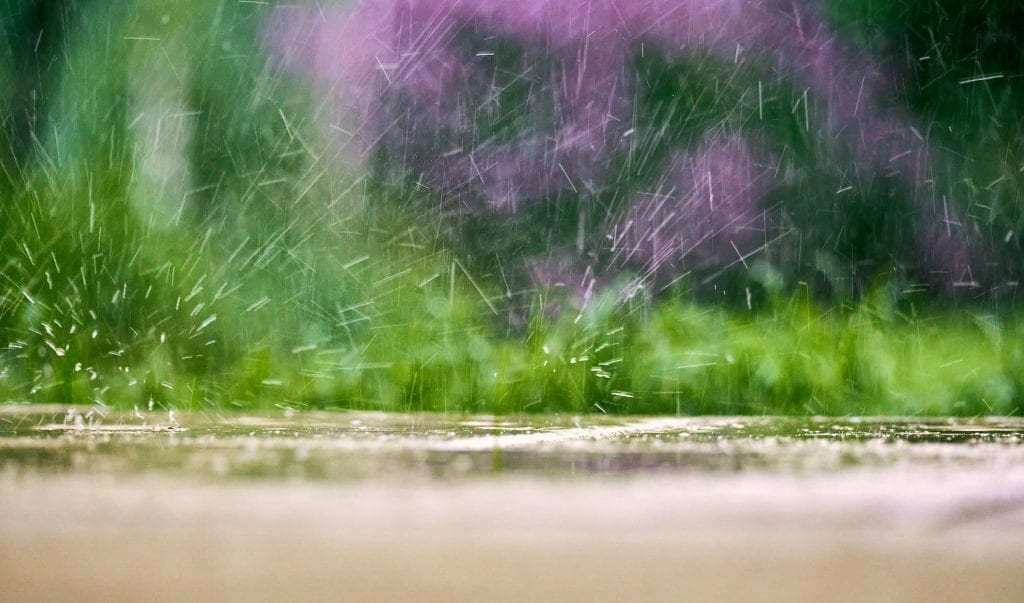Our heavy New England downpours can do a number on all types of landscapes. It doesn’t matter what type of grass composes your lawn and what type of plants line your driveway. Enough rainwater can turn your yard into a muddy mess. In addition, grass and other plants will die if left underwater for too long. Follow our tips to improve drainage in your lawn all year long!
Reduce Your Current Watering
One of the first steps you should take when you notice drainage problems with your lawn is to reconsider your watering schedule. If you water your lawn with a hose or with a sprinkler system, considering watering less often. This will give your soil a chance to dry out between waterings.
If your lawn only gets water from rain, there are things you can do. Make sure you look over your landscape after a heavy storm and identify areas with poor drainage. Muddy pits and pools of standing water are the most common signs of needing to improve drainage. Soft spots when you walk across your lawn can also be an indicator of poor water drainage.
Reroute Existing Drainage
Drainage pipes and gutter systems should protect your home and landscape. However, they can also cause harm if not properly maintained. If your gutter system leaves a muddy pool near the landscape of your home, consider extending the end of the drainage pipe. This gives the water more room to drain. This can help keep the integrity of the soil close to your home’s outer walls intact.
Additionally, check to see if there are any underground drainage pipes installed on your property. Depending on the age of these pipes, they could be problematic. They may be solving drainage issues in one area only to create a pool or flowing water in another area.
Redirect Water With Landscaping
Changing your landscaping itself to improve drainage in your lawn is a major step. If you can’t seem to control the flow of water using other methods, there are several creative ways you can alter your landscape to help. Consider one of the following:
- Adding a drainage ditch to keep water away from your home, sidewalks, and garden
- Turning a low, muddy point into a rain garden to beautify and strengthen the land
- Creating a man-made creek bed to redirect a flow of running water
For this step, it’s important that you bring in an expert. Digging ditches or holes in your lawn without proper planning may only make your drainage problems worse. Our team of experienced landscapers knows what it takes to build a proper drainage plan. We’ll work with you to help find the right landscaping solution to improve drainage in your lawn!
Remember, you’re not just looking to redirect the water to another area it will cause damage. If you use landscaping to move water from one area to another, plan carefully. Make sure you use gentle slopes, gravel and rock, and plants that require heavy watering to achieve the best results. This helps maintain the integrity of your landscape.
Reinforce With A Retaining Wall
A stone or brick retaining wall can be the perfect solution for improving drainage in your landscape. These structures help build up your land where it needs support the most. Often these are low points that receive heavy damage during rainstorms. Retaining walls can help prevent standing pools of water or mudslides from occurring.
In addition, retaining walls add character to your landscape. They can also help increase the value of your home. The masonry of your wall can incorporate as many styles as you can think of. These may include classic limestones, bright red bricks, or a collection of natural stone that blends into your landscape. No matter what your vision is for your landscape, a retaining wall can help you realize it while also increasing the drainage of your lawn.
Get Help to Improve Drainage In Your Lawn
It can take a lot of work to get your lawn ready for a New England rain storm. If you’re in need of a local friendly face to help you improve your lawn’s drainage, reach out to our team! We’ll work with you to find the best solution for your land. What works for a home on the coast won’t work for a home by the park. Each and every landscape has its own unique needs, especially when it comes to dealing with drainage problems. Our expert landscapers will go over your options with you and help you match the solution to the style of your landscape.

